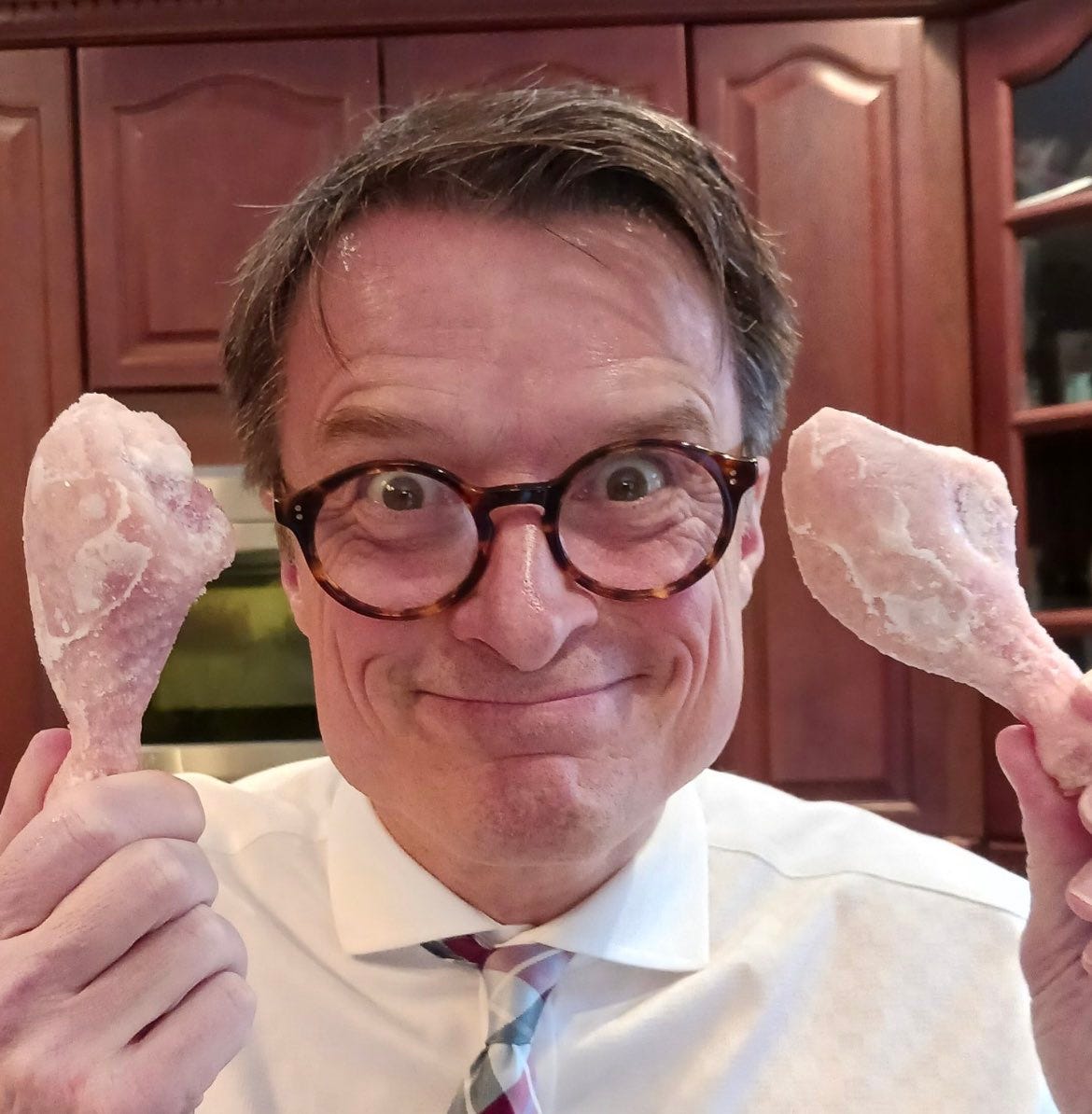The Charlebois Shuffle
What the Food Professor gets wrong
I think I may have broken Sylvain “The Food Professor” Charlebois’ brain.
In January, I wrote about a $60,000 grant the Dalhousie University academic received from the Weston Foundation in 2018, and how that might have played a role in his reflexive tendency to defend Loblaw against any suggestion that their sky-high corporate profits might have something to do with food inflation, despite occasional criticism based on optics alone. When I reached out before writing the piece, he noted that he’s “never been paid by the Weston Foundation, personally”—a notable qualifier.
Charlebois, who clearly wasn’t used to any public criticism, let alone pushback from TV and YouTube personalities who host him regularly, contacted me through an X (Twitter) direct message with a thinly veiled legal threat, which he later denied was anything of that sort. He said “[o]ur attorneys,” suggesting I’ve upset not only the professor but his employer, were “deeply concerned” about my article. I encouraged followers to get in touch with his dean about the Food Professor’s behaviour, which would not be the first time Charlebois’ conduct earned him a talking to from Dal administrators.
In my previous piece, I wrote that, save for Jordan Peterson, no Canadian academic has as large a media profile as Charlebois. Well, it appears that now Charlebois has adopted a toned-down version of Peterson’s persona, using his academic credentials to push right-wing culture war touchstones as objective truths that are being concealed by an academic “mob” who “violently pummel” those who question their methodology. He told a Canadian pork industry gathering that the “so-called ‘woke’ movement is successfully influencing food policies now.”
Like Peterson in his prime, Charlebois will walk back his most outrageous suggestions by claiming he was just asking questions, accusing anyone who inferred otherwise of misinterpreting him. Making bold claims and then backing away from them by feigning neutrality as a dispassionate observer is what I call the “Charlebois Shuffle.”
Carbon taxes vs. corporate profiteering
For Charlebois, corporate profits have nothing to do with the growing price of groceries, but the conservative shibboleth of the carbon tax is directly responsible.
To be clear, the carbon tax is an inadequate market-based solution to a problem created by market forces. It was endorsed by former Reform Party leader Preston Manning as a means of avoiding direct regulation of the fossil fuel industry. But as the Overton window shifts ever rightward, the carbon tax has become an example of “woke” politics, in the words of Alberta Premier Danielle Smith.
“Curious about the impact of Canada’s carbon pricing on food prices since July 1?” Charlebois asked in an August 16 tweet, which then listed food inflation rates by province, insinuating a direct correlation between the two phenomena. But then he backtracked slightly.
“No economist, analyst can definitively state that the numbers below are unaffected by carbon pricing policies,” he added in a follow-up tweet. “Not a single person can claim this with absolute certainty. The research on this matter is currently nonexistent, where we have thoroughly investigated.”
If we can’t prove that food prices are not affected by the carbon tax, how is Charlebois able to argue with such confidence that food inflation is not related to corporate greed? As Charlebois surely knows, economics isn’t a hard science—it’s a social science rooted in a series of assumptions about human behaviour.
When you’re trying to blame everything but growing corporate profits for food inflation, carbon pricing serves as a valuable foil. In both cases, the implicit solution is the same: let the market work its magic and the rest will sort itself out through individual consumer choices.
The pugnacious professor
It’s one thing to go after a humble independent journalist like yours truly, but Charlebois, as of late, has taken to picking fights with academics who suggest that there is economic research on the impact of the carbon tax on food prices, which has found it to be minimal.
When University of Calgary economist Jennifer Winter offered a report concluding just that, he said in a since-deleted exchange: “Looked at your academic profile on Scopus. I’m good.” This earned him a rebuke from the Canadian Women Economists Committee and an ensuing series of complaints to Dalhousie for his lack of professionalism.
Tiring of the backlash, he soon deactivated his account for a brief duration, claiming in an email to one of his fans that his account was repeatedly hacked. As soon as he did, an account with zero followers, @GogoMoron60369, suddenly emerged to zealously defend Dr. Dinner’s honour. “Too bad the Food Professor left Twitter. He was great, brought a lot of facts. Just got tired of dealing with leftist idiots who live on Looserville [sic].”
When University of Calgary economist Trevor Tombe, who previously identified a Milton Friedman quote the Food Prof shared as a fabrication, posted one of his trademark graphs, which shows changes in Canadian food prices largely mirror those of the United States, despite the US having no carbon tax, Charlebois awarded it the title of “most absurd post of the week.”
The Food Prof argues that Tombe’s graph doesn’t project the increase of food prices related to the carbon tax by 2030, when it’s slated to increase to $170 a tonne from the $65 it’s currently at.
But hold on just a second. Charlebois earlier said that we don’t know for certain that consumer good prices are not impacted by the carbon tax. How would projecting the cost into 2030 change that uncertainty? Would it not compound it? Maybe certainty isn’t exactly what Charlebois is aiming for.
In a March Toronto Sun column, Charlebois wrote that “the policy to penalize polluters could hurt citizens more than climate change, the very thing we are all trying to mitigate.” The suggestion that the impact of taxation on consumer goods is worse than the impact of increasing floods, fires and drought reveals just how seriously Charlebois takes the threat posed by the climate crisis.
Posting while Kelowna burns
Since his carbon tax meltdown, Charlebois has taken to flirting with outright climate denial as Canada burns in an unprecedented fashion. As of August 23, 15.4 million hectares of land have been burned by wildfires, almost double the previous record set in 1995, when 7.1 million hectares burned throughout the whole year.
For Charlebois, the pivot from denying any connection between grocer greed and inflation to denying the connection between the climate crisis and wildfires is natural. Addressing either would require a disruption to business as usual.
But nodding towards climate denialism is new territory for the Food Professor. In service of defending grocer profits, Charlebois has previously raised climate change as a factor in food inflation. He’s engaged in whataboutism by comparing the compensation of grocery executives to the larger payouts for energy executives, ignoring how profit margins have increased in both sectors throughout the pandemic. Elsewhere, he’s highlighted the impact of climate change on individual consumer choices.
The mask has slipped. On August 20, he posted two photos comparing wildfires in Kelowna in 2003 and 2023, giving readers the impression that this year’s fires are nothing out of the ordinary.
But, Charlebois said, this was all just a big misunderstanding. “Let’s put politics aside for a moment and focus on what truly matters–supporting those affected by these heartbreaking tragedies. [heart-break emoji] #CompassionOverPolitics,” he tweeted later that day.
On August 21, the Food Prof boasted that the initial post, which he noted accumulated almost 900,000 views, “sparked vital conversations about climate change. Beyond showing compassion for British Columbians, that was its primary intent.”
By the same token, we really should be thanking him for his grant from the Weston Foundation, because it sparked vital conversations about corporate influence in academia.
Immediately after feigning compassionate motives, Charlebois retweeted a post from former Liberal MP and current climate denialist Dan McTeague, who proclaimed: “The left and their climate chums have 1 thing in common: climate bedwetting makes for good grift.”
Perhaps so he doesn’t lose any precious media gigs, Charlebois later tweeted out an NBC News article on a study that notes how climate change has made Canadian wildfires more likely.
This shuffling act no doubt allows the Food Prof to maintain good standing with the corporate press while going after those who challenge him.
Charlebois’ posturing is the product of a media ecosystem that elevates individual academics as thesource of information for all things tangentially related to their narrow field of expertise. It’s certainly not a deterrent when that expert says almost exactly what our corporate masters want to hear.
Originally published in Canadian Dimension




Thanks very much for this cut down of Charlebois. I live in Hfx and of course Dalhousie Univ has puffed him up -- as you say -- and somehow the Food Prof is just part of the neoliberal agenda... his flip flopping is a wonder. Thanks.
Why all of a sudden is everyone blaming fore’s fires on climate change? The food prof makes a point. Forest fires have been around forever, some years more intense, others less so. No one blamed climate change when half of Fort McMurray got burned out. Or Slave Lake.
And then there was “the beast.” The great Chisolm fire of 2001 in northern Alberta. It burned through 1200 sq km and is considered the most intense fire ever recorded, so big that it created its own weather pattern. The average forest fires burns at less than 10,000 kilowatts per metre and at that rate water bombers are no longer considered effective. The Slave Lake fire in 2011 reached 33,000 kilowatts per metre. The Chisholm fire burned at 233,000 kilowatts per metre.